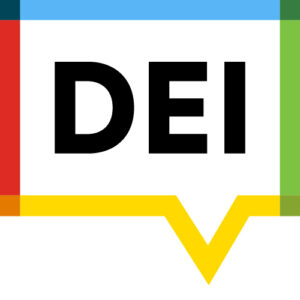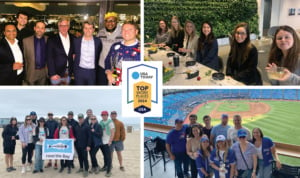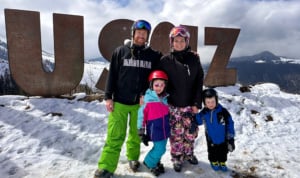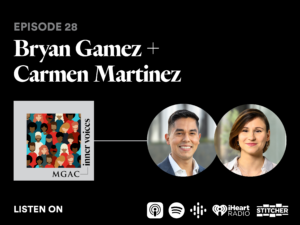MGAC Inner Voices: Episode 8
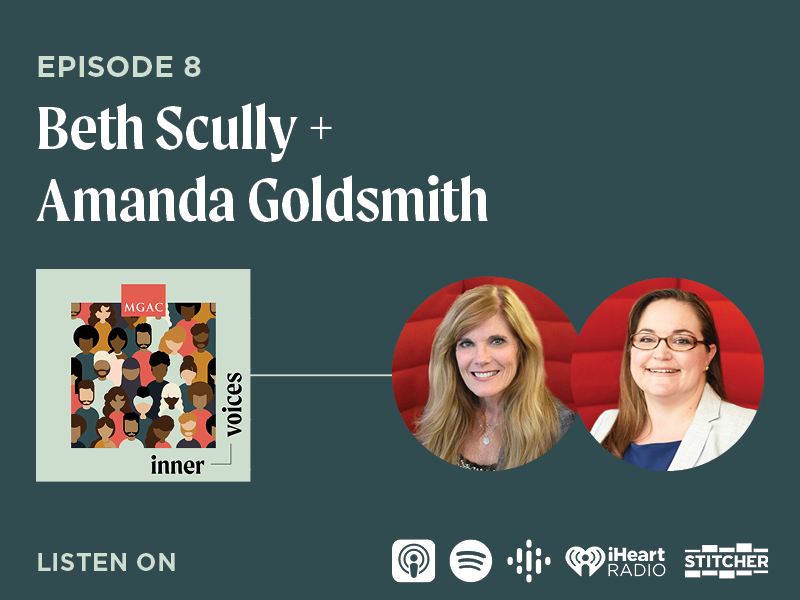
MGAC Inner Voices is an interview format podcast where a diverse mix of employees are interviewed to share their perspective on challenges they have faced in the A/E/C industry as a result of their identity—including race, ethnicity, religion, age, gender, sexuality, ability, etc. By discussing the experiences of our staff, our hope is that their stories will have newfound and powerful resonance with the audience—both to comfort others in similar situations and to encourage those in positions of power to bring about positive, actionable changes to workplace environments for all A/E/C professionals, regardless of their identity.
Beth Scully (MGAC Senior Project Manager, Seattle) talks with Amanda Goldsmith (MGAC Vice President, Washington, DC) about her early career transition from an administrative role to project management and the importance of speaking up for underrepresented groups, including religious minorities and women in construction.
View Transcript
Transcript
Beth: Hi, welcome to "Inner Voices," a podcast digging into issues of diversity, equity, and inclusion in the architecture, engineering, construction industry. This is brought to you by MGAC. I'm Beth Scully coming to you from Seattle, Washington. I serve the company as a senior project manager, and want to begin our podcast with a disclaimer. We are not experts in all things diversity, equity, and inclusion. I, as a cisgender woman, can speak from my personal experiences and do my best to help our participants share their experiences as well.
Our hope is that by sharing our stories, we encourage and explore ways that together we create better outcomes for all of us in the AEC industry and beyond. Today we have the privilege of chatting with Amanda Goldsmith. Amanda is a vice-president at MGAC and will be representing a Jewish woman's perspective in the AEC community. Hi, Amanda.
Amanda: Hi, Beth. Thanks for having me.
Beth: Thanks for being here and welcome to the podcast. Can you share with our listeners a little more details about yourself, what you do, how you do it, and just anything you want to share about yourself here?
Amanda: I'm Amanda Goldsmith, a vice-president of cost management in DC, which is our headquarters' location. I've been with MGAC for two years. And about 15 years prior to that, I've held positions on both the owner-developer and general contracting side, which really has, I think, provided me with a great perspective on some of the challenges that our industry partners face on some of our really complex building programs.
I also am really privileged to serve on a board for the Women in Construction Conference, which is Mid-Atlantic's forum for education, professional development, and networking for women in the build industry, and we really seek to empower women to continue to grow and achieve success in the community.
So, of course, I'm really passionate about that aspect. And as I do represent women in construction, there is another group that I also represent, as you mentioned, and it's not as discussed in the workplace. I think it tends to be a little bit more off-limits in many people's perspective, and that is my identity as a Jewish person, which has a whole different set of challenges.
Beth: I want to begin our podcast by helping our listeners understand a little bit more about your background. You didn't set out to be a woman in construction in the industry, did you?
Amanda: I did not. I initially had started in an admin-type role. It was at a general contracting organization, and I was supporting the pre-construction group and really thought what they were doing was more interesting than what I was doing, and my career kind of took off from there, but I certainly had some challenges initially trying to make that transition and be accepted as a woman in what is a male-dominated field.
Beth: So how has your identity as a Jewish woman or simply a woman affected you in professional spaces?
Amanda: It's really kind of multifaceted. That's an interesting question. When I think through some of my employment history and also interactions in the construction community with subcontractors and others, as a woman, it's often assumed that especially being younger and as I was coming up in the field, that it was always the admin role or I was the one there to get coffee or take the notes.
And there's certainly that level that could have probably held me back had I not been a very strong-willed person and willing to kind of speak up and just pushing myself forward in my career, and along the way, had some really great mentors that were supportive of my path. And that's part of why now I'm so passionate about giving back in that same way and serving as a mentor to the next generation that may not understand some of the awesome opportunities that we have in this industry.
Beth: I think there's true power in the sharing of stories so that people can understand. I think particularly for younger women as they come up, I would like for you to reflect on those experiences. I'm thinking of the construction group in college and being asked to get some coffee at a firm.
Amanda: Right. So I guess early on, as I said, I initially realized that I maybe wanted to take this different path and go out into the field a little bit more, learn more about some of the boots on the ground construction side of things and be more involved in the technical. The firm that I was with when I was kind of looking to explore that, and I brought it up with the leadership there, they weren't open to it. I immediately got the reaction of, "But you're a woman and that's really not the place for you."
And, again, I'm a very strong person and I was brought up that way. I have brothers that I grew up with that helped instill in me that I was not going to be held back by that, and I basically at that same moment without another job lined up to go to, I looked that gentleman in the eye and thanked him for letting me know what I needed, and submitted my resignation at that moment to be able to pursue something that I felt was really more in line with what I would really excel at. So I fortunately then went to another national general contracting firm, and from that point just had the ability to really grow and have some experiences in the field and grow my career from that.
Beth: Like I said, powerful woman. I mean, to have the inner strength as a young woman to say, "Thanks, you've given me that information, I'll be submitting my resignation," it's just exemplary of who you are. So I'm wondering, did you ever report any of the incidences that you experienced or you maybe chose not to?
Amanda: I never did. Now, I think that especially years ago when I was early in my career, I think there was still a bit of a mentality that there would be retribution. That if I reported it, it would maybe fall on deaf ears and what would that get me? So I just chose to find a path that aligned with where I needed to be. It wasn't easy by any means, but certainly, something that I was willing to put in the work for.
Beth: Having not reported it, did it have an impact on your feeling safe as you move forward?
Amanda: I think for me, the impact that I felt is being a bit more guarded. Over time, I've certainly become more open because I think that that's a service I can provide to others who may be in that position of not feeling they can be open yet or not feeling that they have the safe space to talk about some of these issues. So I do feel that it's really important, and so appreciate the opportunity like this today to just have an open dialogue. And hopefully, if even one person can gain a perspective that's changed out of this, I think that it's a success. It's worthwhile.
Beth: What would you tell your younger self now?
Amanda: I think what I would say is it's really important to always be authentic, be your true self, and keep those aspects of your identity because there's so much to be gained by having that level of openness. And it's not always going to be easy or comfortable, but I think that that's...you know, the uncomfortable is sometimes where we make the biggest strides.
Beth: So I want to head off into another place that you and I also discussed and chat with you about holidays if we could.
Amanda: Sure.
Beth: And the challenges that you have faced there.
Amanda: Absolutely. So, of course, being Jewish, we have a different set of holidays than what many in the United States celebrate. There's a lot of Christians, and the recognized holidays are primarily the Christian holidays. So when my biggest holidays of the year are occurring...are holidays of Rosh Hashanah and Yom Kippur, which are in the fall, and there have been times when there's major meetings or presentations that are being scheduled that I'm expected to be a part of and it can create a conflict. How do you address that when it's an expectation or there's a thought that is this going to potentially have a ramification for the company if I'm not at that proposal presentation or if I'm not in this location?
But I actually have found when I bring attention to that, when we look ahead at the calendar, and if something is being scheduled and bringing attention to that, has in one instance that I can think of it actually was that the gentleman for the client that we were supposed to be presenting to was also Jewish. And when it was brought up, he was like, "Thank you because now I don't have that conflict as well. I wasn't going to be able to attend." So thinking through that, that's certainly a holiday side of it.
One of the other things that I think is really interesting is Christmas is such an important holiday for others. And if that's what's important to others and that's on the top of their mind and it's a great time of celebration and family, it's common for people to just naturally throughout the month of December to look at me and say, "What are you doing for Christmas? What are your plans?" And that does not offend me. I find that when I respond, sometimes people feel that they need to apologize, but I want to hear about what other people are doing. That's important to the people that I work with. That's important to my colleagues and friends and clients.
So I think it's important for me to be able to get to know them as to hearing about their plans, but I have no problem sharing that on Christmas I'm probably eating Chinese food and going to the movies because that's our tradition.
Beth: I love it. I love it. So what I'm hearing as I listened to you is that the onus in terms of scheduling and calendars is really on you, right? You have to be very proactive to look ahead and see dates. So how can people be more aware and sensitive about scheduling calendars?
Amanda: So we're talking right now about initially the Jewish calendar, but I, of course, have a lot of friends and colleagues who have other holidays that are not on the Jewish calendar, but maybe they don't fall in line similarly with other things that we're celebrating.
So I think being aware when you are scheduling something. If something is showing on the calendar and you don't know what it is, I think it's important just to ask. We can have that dialogue. There's other things that I think are pretty critical. There's some fasting holidays in some religions, so if we're having meetings to be respectful to individuals who may be fasting. And for example, don't schedule a big celebration during Ramadan when there may be people who can't participate.
A lot of this boils down to not being afraid to ask respectfully, of course. But if you're unsure, I think it's better to err on the side of caution and ask those around you, and then we can from that learn and move together in a way where it is that more inclusive environment.
Beth: How do we bring more sensitivity to dietary considerations around this?
Amanda: That one's always the challenge because, of course, so much of our culture revolves around sharing a meal. In a business setting, we may be having lunch together while we're working through a challenge and we're all in the room together. And I think it's important to just keep in mind that across the board, you don't really know what someone's background is. And maybe it's a health consideration, maybe it's an allergy, but it could truly be something also that as part of someone's identity, there are aspects that they maybe don't eat meat at all, or pork, or shellfish, or other things are not part of what they view as appropriate.
So just being mindful of that and providing options or asking people if lunch is going to be ordered, are there any restrictions? It's a simple question. And I think that there's no way that anybody could be offended by that because regardless of whether it is a religious reason or potentially a health concern, it's a respectful way to proceed.
Beth: It's important always to take a pause, and just, to your point, ask the question. People are not offended. In fact, I think it provides more inclusivity to be sensitive around these topics. So taking now a broader view of things, I want to chat with you about the advantages of diversity and ask you why is diversity, equity, and inclusion important in the workplace, in your opinion, and what value does it add?
Amanda: If we can show up as our authentic selves, as individuals contributing our voices in a safe place, it really does foster a tremendously high degree of engagement, which also then results in greater productivity, innovation, and that all contributes to the bottom line. So it makes good business sense.
From the aspect of just being a good human being, it also makes good sense for people to feel that they are included and that their voice matters. And we also then benefit from that diversity of mindset, and it can help us to solve challenges because we're now coming to it from all these different perspectives and backgrounds that I think are really important to allowing us to move forward in a really, really effective way.
Beth: How does your unique identity make you a strong asset to your team, Amanda, and how has it informed who you are professionally?
Amanda: Well, I certainly have a perspective on being a woman. I have the Jewish perspective. As far as some of what I do on a personal note, I also am part of a group of women that is a home-based national program of Jewish and Muslim members that meets together so that we can really build trust and respect and those relationships and understanding.
And I think all of that has helped me not only to understand those specific perspectives, but to continue to be open to all these other beautiful things that are occurring in the world and around me that really could benefit whatever we're doing, whether it's professionally or personally.
Beth: Bravo. So I know that in chatting with you I discovered you are a board member of ACE, I'd love for you to tell us a little bit about that and also your best story as a result of being part of that.
Amanda: So I'm not a board member of ACE, I'm a board member of the Women in Construction Conference, and the organization that we support through scholarships is ACE mentorship. So having that relationships of mentoring young women and seeing them grow through their high school career and then benefiting from a scholarship and potentially the internships in the industry and mentoring the next generation is just really, really amazing.
I have so many experiences with that, and I think the common thread that I find is when a young woman, an individual that potentially had no idea that this was a viable career, a viable field, that they could do something in the architecture, engineering, building, construction, any of those that are related to our industry, and to have that opportunity to just learn about something that is a fantastic profession that would allow them to grow and excel in the future, that is just so rewarding. And to be able to be a part of that is something I really do appreciate.
Beth: I know as a woman alongside of you, had someone like yourself existed that could have spoken to my younger self... You know, in my younger years, I wasn't as powerful as you, I would not have stood up and said, "Thank you. Here's my resignation." I swallowed a lot, to be frank, as a woman back in the day. So I just can't thank you enough for being part of that organization and for mentoring young women and being as broad-minded as you are beyond our work at MGAC with clients and colleagues.
I just want to express my appreciation for what you do beyond the workspace in encouraging young women in an industry where, you know, we're seeing numbers go down in terms of participation. It's awesome. So I want to talk about or ask you, what measures can our colleagues take when clients seem uncomfortable with diversity?
Amanda: I think in my experience when someone seems uncomfortable, it tends to be driven by a level of fear. Especially I think from our client perspective, it may be that they're worried about a misstep, that they don't want a PR nightmare because they've potentially messed up, said the wrong thing to an employee, a board member, a stakeholder, or the wider community, whether that's verbally or social media or some other method of communication. And that is really a lot of times, again, in my experience, that is really that underlying factor to that level of discomfort that can paralyze people into inaction.
So being uncomfortable is not the reason to do nothing. I think respectfully having a conversation to try to understand what's really driving that discomfort so that we can address it and then continue the dialogue and support the mission is really how we can deal with that in a positive way.
Beth: So I know you do this regularly because of your involvement outside of MGAC, but what advice would you give young people pursuing careers in the AEC industry who might be worried about facing similar discrimination that you have as a Jewish woman or just a woman?
Amanda: I think my biggest tip is don't be afraid or ashamed. Be who you are without exception. It seems simple, but I think really that's for me some of the best advice I can give. And that maybe for some people, it doesn't mean that they are completely open in having conversations like this. You can still be who you are and not have to compromise your own identity in order to achieve your goals professionally, and I think that it's about achieving that balance.
Beth: Obviously, we're having this conversation, and given where we are in this point of history, we are trying to normalize the conversations we're having, right? So how would you like to normalize these conversations in the workplace?
Amanda: Continuing to have the conversations, and when the taboo nature of a topic is taken off the table, I think that's where we can really have that honest, respectful dialogue and gain a greater level of appreciation and benefit from those unique perspectives.
So I think acknowledging that it's a journey and we're all at a different point on that journey, on that path. Some people, again, may be much more comfortable having an in-depth conversation. Whereas I do know a lot of people who are perfectly comfortable with their identity, but not comfortable openly discussing the topics because there can be negative connotation when some people hear Jewish or Muslim or Islam. And it's so unfortunate, but I think in order for everyone to really feel empowered, it's really critical that we continue the conversation at whatever level each individual is comfortable engaging in that.
Beth: I think it's fair to say that many of our coworkers may or may not have had personal experience with discrimination or negative treatment as a result of their identity. What advice would you give them on how to be an ally?
Amanda: I think speaking up as far as for someone who's seeking to be an ally, don't let fear of a misstep prevent you from taking action. If you're unsure of someone's comfort level, you know, quietly one-on-one maybe, respectfully ask them. Don't assume on another's behalf what they may or may not want a situation to be. So I think that's the biggest thing, is we need to really not be making assumptions. It is a lot about communication, and making sure that we are respecting these different perspectives that we all bring.
Beth: As humans, how do you think we increase our respect for one another?
Amanda: You know, it's really interesting because I'll go back to my personal involvement in the group of Jewish and Muslim women, where I think when you get to know someone at an individual level, it's really difficult to then have that misunderstanding because when you get to know someone and you see what makes them tick and their background and that family is also important to them or things that really are important to them at their core, whether it's you're in the workplace or at home, as we share that knowledge and friendship, we're able to celebrate that and lead to more equality there.
Beth: I feel like this is a question that you're already doing it, but what are your personal action items to get us to a place of more diversity, more discussion, all the things we're chatting about, more inclusivity, your personal action items? Maybe let's set it within the context of our company.
Amanda: So my next real mission on this in the context of our company in the context of our industry is that I think we are in such an interesting position to change the landscape of a built environment in a way that supports an inclusive and diverse environment.
So an example of that is we have the benefit of being involved in projects as they're taking shape from a design perspective, so we can facilitate conversations as the project manager, as the owner's representative, to potentially incorporate design changes that have a minimal cost impact, have a minimal impact really to those who wouldn't use necessarily the facility.
But something like a gender-neutral restroom or a meditation or prayer room, hand washing or foot wash stations, things like that that are really, again, relatively small impact to the overall design or cost of a project but could have a huge impact to the individuals and the end-users who are in that space as a means of making them feel that they have that level of
Beth: That's beautiful. I mean, it's just a natural way to help a company become more diverse. People would seek that out and see, oh my gosh, built into the very design of your building, I'm included, I'm seen, I'm heard.
Amanda: Exactly, exactly.
Beth: I love it. I love it.
Amanda: It's so powerful that we potentially have that opportunity to have that level of impact. I think that that is just one way that we can positively move things forward in that direction.
Beth: Beautiful. So I would love to hear what your hopes and dreams for the state of the industry in our company are in 10 years.
Amanda: Oh, my goodness. Well, going with what I was just speaking about, I'd love for that to just become part of the norm. That it's not something that is an uncomfortable conversation to people, and it's not something where we're raising our hand and saying, "Hey, but did anybody think about the gender-neutral bathrooms?"
I mean, I think it would be great if those things just became part of the fabric of what we're looking at and that, as an organization, that we really continue to embrace all of the differences that we have and the benefits that it brings to us by having such a diverse population within our organization.
Beth: Amanda, it's always a privilege and an honor to chat with you, but before we close this podcast off, I wonder if we can take a moment for you to offer any other thoughts, anything that you want to include in this podcast for others to think about before we close it off.
Amanda: Again, I think really it's about don't let fear prevent you from asking the question or having a conversation that could really change things for the positive. So having meaningful and intentional engagement with one another. It's not about statistics of saying, "We've checked all these boxes," it's about intuitively I think sensing, "Are we authentically engaging one another, and what does that look like, and how can we continue that?" I think it really does all boil down to open, honest dialogue and having that level of respect where we can have that safe environment for those conversations to occur.
Beth: Beautiful. Thank you so much, Amanda. This has been MGAC's "Inner Voices." And again, I offer my thanks and my deep gratitude for you, for participating with us, Amanda, and your beautiful articulation of some of the thoughts surrounding your personal identity as a strong, powerful Jewish woman in the industry. So thank you again for that.
Amanda: Thank you, Beth.
Beth: That concludes this podcast of MGAC "Inner Voices." Thank you so much for joining us and please check back next month for another episode of "Inner Voices." Until then, take care.
